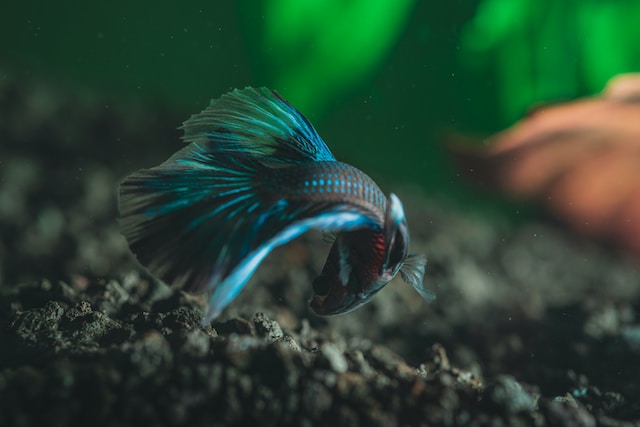Table of Contents
Are you interested in keeping betta fish as pets but unsure whether they are saltwater or freshwater fish? Betta fish, also known as Siamese fighting fish, are a popular choice for aquarium enthusiasts due to their vibrant colors and unique personalities. However, there is often confusion surrounding the type of water these fish require to thrive.
To answer the question, betta fish are freshwater fish. They originate from the shallow waters of rice paddies and swamps in Thailand and other parts of Southeast Asia. Betta fish are adapted to living in warm, stagnant water with low oxygen levels, which is why they have a unique labyrinth organ that allows them to breathe air from the surface.
Despite being freshwater fish, bettas do require specific water conditions to remain healthy. They prefer warm water with a temperature range of 76-82°F and a pH level between 6.5-7.5. It is also important to provide them with a filtered and cycled aquarium to maintain good water quality.
By understanding the needs of betta fish and providing them with the appropriate care, you can enjoy these beautiful and fascinating creatures as pets.
Betta Fish Basics
Betta fish, also recognized as Siamese fighting fish, are a popular selection among aquarium hobbyists. These fish are indigenous to Thailand and are renowned for their striking hues and flowing fins. Betta fish are tropical creatures and necessitate warm water to flourish.
Betta fish are freshwater fish and should never be housed in saltwater. They are acclimatized to dwell in shallow, sluggish waters such as rice paddies, streams, and swamps. Betta fish are capable of inhaling air directly from the water’s surface owing to their labyrinth organ, which enables them to survive in low-oxygen environments.
Betta fish are comparatively petite and usually attain a length of 2-3 inches. They are meat-eating and necessitate a diet of premium fish food, complemented with live or frozen foods such as brine shrimp or bloodworms. Betta fish are solitary beings and should be kept individually in their own aquarium.
When setting up an aquarium for a betta fish, it is important to provide them with plenty of hiding places and plants to swim around. Betta fish are active swimmers and require plenty of space to move around. A heater and filter are also essential to maintain a stable water temperature and keep the water clean.
Freshwater or Saltwater: The Habitat of Betta Fish
Betta fish, also known as Siamese fighting fish, are freshwater fish. They are native to the shallow waters of rice paddies, swamps, and slow-moving streams in Southeast Asia, including Thailand, Cambodia, and Vietnam.
In the wild, betta fish live in warm, tropical environments with temperatures ranging from 75 to 86 degrees Fahrenheit. They prefer water with a pH level between 6.5 and 7.5, which is slightly acidic to neutral.
Betta fish are adapted to live in freshwater habitats, and they cannot survive in saltwater. If you keep a betta fish in saltwater, it will become stressed and eventually die.
It’s important to note that while betta fish are freshwater fish, they still require specific water conditions to thrive. You should provide your betta fish with a tank that has a suitable filter, heater, and substrate. It is also essential to frequently test the water to verify that the pH level and other parameters are within the appropriate range.
Betta Fish Adaptation to Freshwater
Betta fish are freshwater fish that have adapted to living in a wide range of conditions. They are able to survive in a variety of water types, including stagnant water, which is often found in their native habitats in Southeast Asia.
One of the key adaptations of betta fish to freshwater is their ability to breathe air. Betta fish possess a unique organ known as the labyrinth organ, which enables them to extract oxygen from the air. This adaptation is especially crucial for betta fish inhabiting stagnant waters, where the oxygen level in the water is low.
Another adaptation of betta fish to freshwater is their ability to tolerate a wide range of water conditions. Betta fish can endure water with a pH range of 6.0 to 8.0 and a temperature range of 75°F to 82°F. They can also withstand water with low oxygen levels and high levels of ammonia and nitrite.
Betta fish have also adapted to freshwater by developing a unique set of behaviors. For example, they are known for their aggressive behavior towards other fish, which is thought to be a result of their territorial nature in the wild. Betta fish are also known for their ability to build bubble nests, which they use to protect their eggs.
Misconceptions About Betta Fish Habitat
When it comes to betta fish, there are many misconceptions about their natural habitat. One of the most common misconceptions is that betta fish are saltwater fish. However, this is not true. Betta fish are actually freshwater fish and they cannot survive in saltwater.
Another misconception is that betta fish can thrive in small bowls or containers. While betta fish can survive in small spaces, they need at least 2.5 gallons of water to thrive. It is important to provide them with enough space to swim and explore, as well as proper filtration and heating.
Some people also believe that betta fish can live in unheated and unfiltered water. This is not true. Betta fish require clean, filtered water with a temperature between 76-82°F (24-28°C). Without proper filtration and heating, their water can quickly become toxic and harmful to their health.
Lastly, some people think that betta fish can live with other fish in a community tank. While betta fish can coexist with other fish, they are known to be aggressive towards other bettas and fish with long, flowing fins. It is important to research and carefully select tank mates for your betta fish to ensure they live in a peaceful and safe environment.
Factors Influencing Betta Fish Habitat Preference
When it comes to betta fish, their habitat preference is influenced by several factors. Here are some of the key factors that determine whether betta fish thrive in freshwater or saltwater environments:
1. Origin
Betta fish are native to Southeast Asia, where they live in shallow, slow-moving waters such as rice paddies, swamps, and streams. These environments are predominantly freshwater, so it makes sense that betta fish are naturally adapted to freshwater habitats.
2. Salinity Tolerance
Betta fish are not naturally adapted to saltwater, and they have a low tolerance for salinity. While some species of fish can tolerate a wide range of salinities, betta fish are not one of them. In fact, exposing betta fish to saltwater can be harmful or even fatal to them.
3. Water Quality
Betta fish are sensitive to changes in water quality, and they require a specific range of pH, temperature, and water hardness to thrive. Freshwater environments are generally easier to maintain and provide more stable water conditions than saltwater environments.
4. Diet
Betta fish are carnivorous and require a protein-rich diet to stay healthy. In the wild, they feed on insects, larvae, and small crustaceans. These types of prey are more commonly found in freshwater environments than in saltwater environments.
5. Availability of Suitable Habitat
In the wild, betta fish are limited to the habitats that are available to them. In captivity, they can be kept in either freshwater or saltwater environments, but providing a suitable habitat that meets their needs is crucial for their health and well-being.
Importance of Freshwater for Betta Fish Health
As you may already know, betta fish are freshwater fish. They are not able to survive in saltwater environments. Therefore, it is essential to maintain freshwater conditions in their tank to ensure their health and well-being.
One of the most crucial aspects of freshwater for betta fish health is the pH level. Bettas require a pH level between 6.5 and 7.5 to thrive. Anything outside of this range can cause stress and lead to health problems.
Another important factor is water hardness. Bettas prefer soft to moderately hard water. If the water is too hard, it can lead to stress and even death.
Additionally, keeping the water clean is crucial for betta fish health. A dirty tank can lead to bacterial and fungal infections, which can be fatal for bettas. It is recommended to perform regular water changes and clean the tank regularly to maintain a healthy environment for your betta.
Conclusion
Now that you have learned about the habitat, behavior, and physical characteristics of betta fish, you know that they are freshwater fish. While some species of betta fish can tolerate brackish water, they are not true saltwater fish.
Overall, while some species of fish can thrive in both freshwater and saltwater environments, betta fish are naturally adapted to freshwater habitats. Providing a suitable freshwater habitat that meets their needs is the best way to ensure that they live a healthy and happy life.
Remember to always do your research before getting a pet fish and ensure that you can provide them with the proper care they need to thrive. With the right care, your betta fish can live a long and healthy life in their freshwater home.







